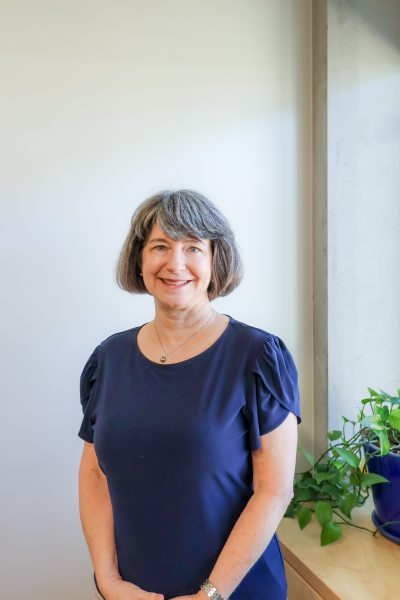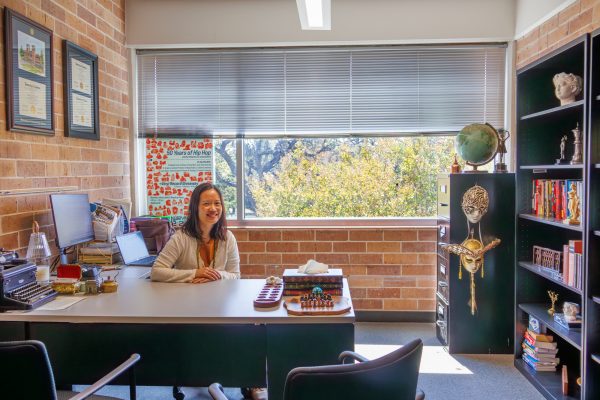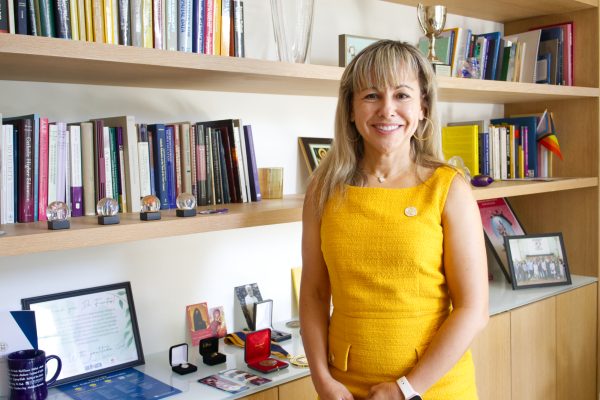Fiction professor kicks off this year’s Visiting Writers Series
When walking into Mary Helen Specht’s office, the very first thing to see is a purple rhinoceros on the head of an iridescent man wearing a Shakespearean collar. She will explain that she is working on her first novel, and it will explore the lives and stories of four people, one of which may be Specht herself.
She has been to Chile, Ecuador and Nigeria, and she knows that when traveling to a foreign country, the fabric that makes your world is suddenly clear and visible in the context of a rich, novel world. She will say that it is impossible not to notice things for the first time, like the way light looks through a tree.
When she shares her work at the St. Edward’s University Visiting Writers Series on Thursday, Oct. 18 at 7:30 p.m. in the Maloney room, she will share these things and more.
Valerie Huerta sat down with Specht to discuss her involvement in the Visiting Writer’s Series.
Valerie Huerta: What is your role in the Visiting Writers Series?
Mary Helen Specht: The Visiting Writers Series brings novelists, poets, playwrights and other creative writers to campus each year to read and answer questions from students and the community.
I’m an unusual speaker for the Visiting Writers Series because I’m not exactly “visiting.” However, Professor Carrie Fountain asked me to read since I’m the new fiction professor here on campus; we’d like students to have the opportunity to get acquainted with my creative work and to ask me questions about my process.
VH: Where do you draw inspiration from?
MHS: I draw inspiration from everything. I am one of those annoying people who will pull out a notebook in the middle of a conversation and write down what you’re saying. Sometimes my inspiration comes from personal experience, but just as often it’s the opposite. I hear or see something in life or on the news and then find myself imagining what it would be like to be the person in that situation.
For example, the germ for a major plot point in the novel I’m currently working on came from the radio. I was in my car listening to NPR, and a man was discussing his family’s experience with Huntington’s Disease, the genetic disease that killed Woody Guthrie. I was so moved by his description of what it was like knowing he would die from the same horrible disease that he’d watched his father die from. I immediately created a character confronted by a similar situation. For me, it spoke to what we all experience watching our older family members age and die, but it was amplified by 100.
That’s the sort of thing I’m always looking for in fiction, a way to get at the common human experience through the specific story.
VH: Why is storytelling important to you?
MHS: One of my teachers years ago told me that storytelling is what it means to be human. I believe that. Whether or not we consider ourselves readers or writers, we are all storytellers of some sort. Storytelling is how we make meaning out of our lives; it’s also how we first learn to empathize with the lives and troubles of others.
A good storyteller makes us understand people we have nothing in common with and places that we’ve never experienced.
VH: Why do you teach?
MHS: I love teaching writing because it means I get to spend my days discussing stories that I love with students who, somewhere along the way, have also caught the writing bug. I also love seeing what new and unique and imaginative things my students come up with.
In terms of my teaching philosophy, I think it’s important to introduce students to the tools that can improve their craft. I don’t tell them what to write or how to write; that’s something each writer must come to on his or her own. However, I try to use the workshop as a setting where students can gain more control over their craft, where they can improve their skills at analyzing stories and using what they learned in their own work.





